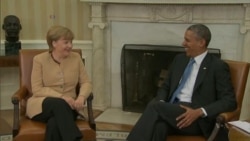German Chancellor Angela Merkel, in Kyiv and Moscow over the last few days, came away with no peace deal in hand. Now she'll be coming to the White House on Sunday, searching for a way forward on Ukraine.
This will be President Barack Obama’s chance to hear from an important European ally before deciding whether to send lethal aid to help Ukraine defend itself against Russia-supported separatists.
“The president is going to make a decision that he believes is in the broader national security interests of the United States," said White House spokesman Josh Earnest. "And part of that is understanding what sort of impact the decisions that we make have on our allies.”
The impact on Germany’s trade relations with Russia is a big concern for Merkel and part of the reason she doesn’t want to send weapons to the Ukrainians.
Steven Pifer, a former U.S. ambassador to Ukraine and now a senior fellow at the Brookings Institution, said he thought the Germans "tend to be a bit shy about these kinds of hard power. It was interesting to me, though, that Chancellor Merkel said that we [Germany] will not provide [weaponry]. She did not say nobody else should provide it.”
For both Obama and Merkel, the goal is a diplomatic solution.
Abraham Newman, a professor of international relations at Georgetown University in Washington, said the differing views on providing lethal aid to Ukraine does not mean the two leaders are divided as they face Russia.
“This is a way," he said, "that they can use bargaining leverage to say, ‘Look, the United States is going to put pressure on you to increase lethal aid. We don’t want that of course. But how long can we hold off the United States?’ So for me, this isn’t really a schism but it’s a negotiating tactic.”
Obama and Merkel have had significant differences in the past. On Merkel’s last visit to Washington, Obama sought to mend relations following revelations that U.S. spies had been listening in on her personal communications.
With those troubles behind them, White House officials say it will be a generally low-key meeting this time, focused on refining a common approach to the crisis in Ukraine, as well as trade, counterterrorism, Iran and other issues.





